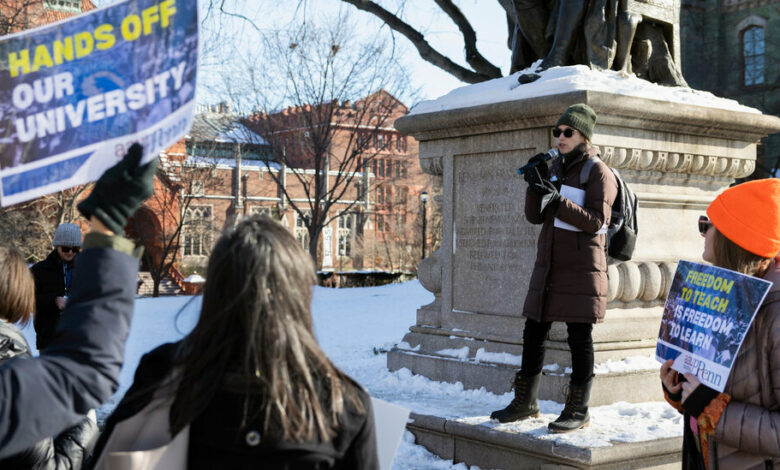Tensions at Penn can only increase after Magill’s resignation

Campus protests are not usually directed at a single person. But last week, professors at the University of Pennsylvania organized a rally against Marc Rowan, the New York private equity billionaire.
As a Penn alumnus and a major benefactor of the university, Mr. Rowan deployed his formidable resources in a ruthless campaign against Penn’s president, M. Elizabeth Magill, leading to her resignation in December.
But it was what happened next that fueled the protest. Mr. Rowan sent a four-page email to university administrators titled “Moving Forward,” which many professors interpreted as a blueprint for a more conservative campus.
Amy C. Offner, a history professor who led the protest, called the document a proposed “hostile takeover of the university’s core academic functions.”
The protest of about 100 people was a sign that campus discord was likely to continue despite Ms. Magill’s resignation, which many in Penn’s community hoped would quell outrage over her testimony at a congressional hearing that appeared ambiguous about whether students would be punished for calling for Jewish genocide.
Instead, Penn, now under interim president Dr. J. Larry Jameson, faces a line of alumni, donors and students who claim the university has been taken over by a liberal orthodoxy that tolerates or even promotes anti-Semitism.
Penn is now under attack from many sides. It is the defendant in a lawsuit brought by Jewish students and funded in part by unnamed donors, and the subject of a congressional investigation with subpoena power. Republican state lawmakers have threatened to withhold $31 million from its veterinary program, the only state appropriation the private university receives.
Two alumni, Mr. Rowan and Ronald S. Lauder, the cosmetics heir, were notable among the sponsors of a fundraising event for the re-election of Representative Virginia Foxx, Republican of North Carolina, whose House committee is investigating Penn and other universities over claims of anti-Semitism.
Mr. Rowan and Mr. Lauder did not attend the fundraiser, but the event’s organizer — Andrew Sabin, a New Yorker who made a fortune in metal recycling — said the sponsors shared a common opposition to anti-Semitism and hope to pressure Congress to revoke federal funding and the tax-exempt status of some universities.
A separate research by the House Ways and Means Committee has questioned whether anti-Semitism on campus threatens the nonprofit status of Penn, as well as Cornell, Harvard and MIT
“We have a very, very aggressive path forward,” said Mr. Sabin, who did not attend Penn.
Some university professors say the attack on Penn is part of a conservative effort, started by governors like Ron DeSantis of Florida, to reform American higher education — an effort that is now expanding to dozens of universities, including Penn, Harvard and Columbia, which are now under investigation by the federal government over reports of anti-Semitism.
“This is an anti-democratic attack that is happening not just at Penn, but across the country, including public universities in Florida, Texas, Ohio and beyond,” said Dr. Offner, president of the university chapter of the American Association of University Professors, a professional faculty organization.
Penn, she said, had become “the ground zero of a coordinated national attack on higher education, an attack orchestrated by billionaires, lobbying organizations and politicians who want to control what can be studied and taught in the United States.”
On Wednesday — two days after the fundraiser, which raised an estimated $60,000 for her campaign — Ms. Foxx filed a Letter of 14 pages at the university and demanded documents that could reflect the concerns of some Penn donors that the number of Jewish students at Penn has declined as the university has admitted more Asian, black and Hispanic students.
Ms. Foxx’s demands cited figures from the Jewish organization Hillel International showing that Penn’s Jewish student population had fallen to about 1,600, or 16.4 percent of the student body, by 2023, compared to about 2,500 students, or 25 percent, in 2013. Jews make up just over 2 percent of the U.S. population.
Mr Rowan’s proposal, which was published in its entirety by The Philadelphia Inquirerwas formulated as a series of questions about the direction of the university. Questions were raised about whether some academic programs should be eliminated and whether merit and academic excellence should be the primary consideration in hiring and admissions, which was interpreted by many as a call to eliminate diversity considerations.
The document immediately provoked strong protest push back of faculty members, more than 1,200 of whom are one letter sent to the curators on January 16. “We oppose all attempts by curators, donors and other external actors to influence our academic policies and undermine academic freedom,” the letter reads.
The faculty, however, disagrees. Michael J. Kahana, professor of psychology, responded directly in an email to the faculty senate.
“Your letter specifically addresses Marc Rowan’s questions, which I have reviewed and found reasonable and helpful,” wrote Dr. Kahana, who shared his email with The New York Times. Dr. Kahana recently hosted one trip at Israeli universities by Penn professors, as a sign of solidarity with academic colleagues in Israel.
Mr. Rowan, who chairs an advisory panel at Wharton, Penn’s prestigious business school, suggested through a spokesman that the faculty had misinterpreted his intentions.
“Marc says these are the questions, he’s not trying to give answers,” said Steven Lipin, the spokesman. “It’s not what Marc wants in any way. Ultimately, it’s what the trustees and faculty want.”
At the meeting last week, just after Penn’s spring semester began, professors and others stood outside in freezing temperatures for nearly two hours, saying they were seeking assurances from Dr. Jameson, Penn’s interim president, that Mr. Rowan’s ideas would not be embraced. About a dozen faculty speakers, as well as several students, said they worried that donors were on a crusade to attack Penn’s traditions of diversity, academic freedom and free speech.
So far, the university administration has not made any statements that professors would consider a strong rejection of Mr. Rowan. But in a recent Q. and A. document Posted on the university’s website, Dr. Jameson, an endocrinologist who served as dean of Penn’s medical school, reiterated the idea that the role of curators was to delegate management to academic leaders and faculty.
Neither Dr. Neither Jameson nor the university’s new chairman, Ramanan Raghavendran, an investor, was available for comment for this article.
Mr. Raghavendran, who has three Penn degrees, including Wharton, was named following the resignation of Scott L. Bok, an ally of Ms. Magill. The selection of Mr. Raghavendran to lead the board was seen as a hopeful sign by some faculty members, who cited his support for Penn’s liberal arts college, the School of Arts and Sciences, where he served on the advisory board.
Dr. Harun Kucuk, associate professor of history and sociology of science, said professors could be ready for even more activism. The professor’s group, AAUP, said membership on Penn’s campus is rising.
Dr. Kucuk recently resigned as director of the university’s Middle East Center in protest over the university’s attempt to block the screening of a film critical of Israel.
“There is still time to put things right,” he said, “and I don’t think that will be for another year.”




